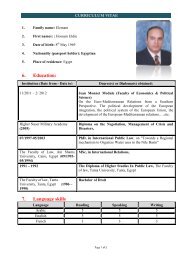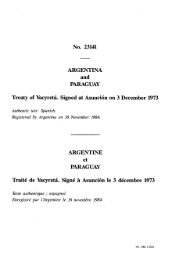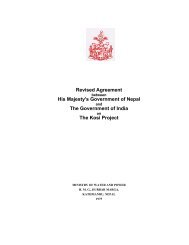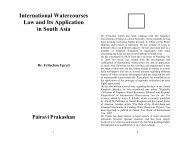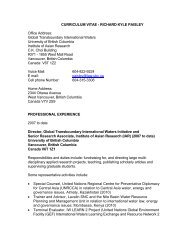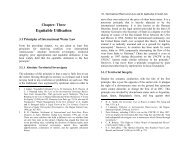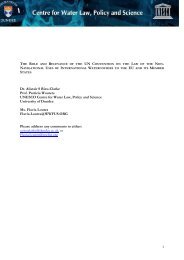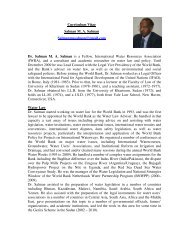Upreti, Trilochan, International Watercourses Law and Its Application ...
Upreti, Trilochan, International Watercourses Law and Its Application ...
Upreti, Trilochan, International Watercourses Law and Its Application ...
You also want an ePaper? Increase the reach of your titles
YUMPU automatically turns print PDFs into web optimized ePapers that Google loves.
78 / <strong>International</strong> <strong>Watercourses</strong> <strong>Law</strong> <strong>and</strong> <strong>Its</strong> <strong>Application</strong> in South Asia Development <strong>and</strong> Codification of <strong>International</strong> <strong>Watercourses</strong> <strong>Law</strong> / 79justification of an existing use in specific circumstances.Consistent with the principle of equitable utilisation, states areprohibited from acting merely as they please or against theconditions embodied in Article X. 155 Article XI stipulates that ifArticle X is violated, then such responsible states mustnegotiate, <strong>and</strong> cease to conduct themselves in a wrongfulmanner <strong>and</strong> compensate the harmed state in case of any injuryalready incurred. Chapter 4 deals with navigation; Chapter 5with timber floating; Chapter 6 relates to procedures for theprevention <strong>and</strong> settlement of disputes; <strong>and</strong> Annex A containsModel Rules for the constitution of the conciliation commissionfor the settlement of dispute. In fact many elements of the ruleswere already state practices recognised by the internationalcommunity. The Helsinki rules are the foundation for therecently adopted UNCIW with most of the principles, e.g.,principle of equitable utilisation <strong>and</strong> no harm rule, inheritedfrom it. 156The magnitude of the problems in the Nile basin, Indus,Columbia <strong>and</strong> Great Lakes in North America <strong>and</strong> Jordan wasvery serious <strong>and</strong> posed a threat to peace <strong>and</strong> security. At theoutset of these disputes, the ILA had begun work on the law155 Article X, “(1) Consistent with the principle of equitable utilisation ofthe waters of an international drainage basin, a statea. must prevent any new form of water pollution or anyincrease in the degree of existing water pollution in aninternational drainage basin which would cause substantiallyinjury in the territory of a co-basin state, <strong>and</strong>b. should take all reasonable measures to abate existing waterpollution in an international drainage basin which to such anextent that no substantial damage is caused in the territory ofa co-basin state;(2) the rule stated in paragraph 1 of this article applies to waterpollution originating:a. within a territory of the state, orb. outside the territory of the state, if it is caused by the state'sconduct.”156 C B. Bourne, "The <strong>International</strong> <strong>Law</strong> Association 's Contribution to<strong>International</strong> Water Resources <strong>Law</strong>" (1996) in 36 NRJ, pp. 160-166.governing the utilisation of international waters in 1954. 157There was a dem<strong>and</strong> for universally applicable rules with aholistic <strong>and</strong> integrated development approach from theinternational community. In such circumstances, a committeewas constituted under the chairmanship of Clyde Eagleton. Thecommittee, also known as the River Committee, submitted itsreport, which later was adopted by the ILA in Helsinki in 1966.The ILA took account of state practices around the globe,comments <strong>and</strong> observations of learned societies <strong>and</strong> thedecisions of courts <strong>and</strong> tribunals. These rules enacted by thecommittee are holistic, integrated <strong>and</strong> serve as universaljurisdiction rules. 158 Although the members of the committee orassociation did represent their nations, it was in their personalcapacity that the rules were formulated, not as governmentrepresentatives. There is a water resources committee under theILA that is still involved in developing <strong>and</strong> adopting theequitable rules of IWC. 159 Until now the Water ResourcesCommittee has been reviewing the 1966 Helsinki rules <strong>and</strong>several meetings of the ILA have taken place, e.g., London <strong>and</strong>New Delhi conferences in 2000 <strong>and</strong> 2002, reviewing theprogress. The committee has reviewed general principles ofwater management <strong>and</strong> public participation, integrating theprinciples of IWL <strong>and</strong> sustainable development. Furthermore, ithas also been incorporating modern st<strong>and</strong>ards governingnavigation on international or transboundary water, reexaminingthe principles of water administration <strong>and</strong> resolvinginternational disputes related to IWC.In the context of separate drainage basins, each state hasdifferent views. It was obvious that addressing the divergentinterests <strong>and</strong> views through a single set of universal rules was157 Ibid. p 155.158 Ibid. pp 158-164.159 Presently the committee is involved in the codification <strong>and</strong> draftingprocess <strong>and</strong> recently they held a meeting about the amendment of 1966Helsinki Rules in Vienna. See www.ila-hq.org.



